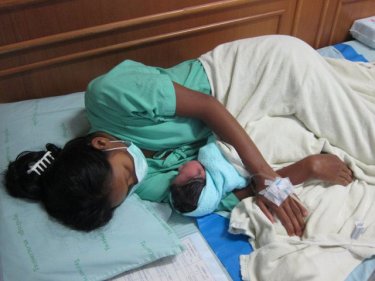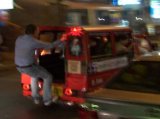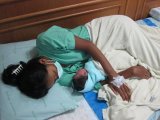PHUKET: A plan by the Thai government to combat human trafficking raises the nightmare scenario of pregnant women being trucked or bussed off Phuket once their bulging tummies are discovered.
Many legal and illegal workers from Burma fall pregnant and give birth to sons and daughters on Phuket.
Now a new scheme to have these women deported once their pregnancies are detected is alarming human rights organisations.
Implementing such a policy would throw into sharp reverse the tolerant approach of Phuket's hospitals and health authorities.
To have pregnant workers living in fear of exposure and not going to see a doctor is the kind of nightmare raised by the latest pronouncement from the government.
What will happen to these women? Until now, they have been given health care on Phuket in adequate proportions, similar to that of all other women on Phuket.
Scores of babies are born to migrant workers on Phuket - we've seen them with their newborns on mats in the corridors when Phuket's public hospitals are especially overcrowded.
With international agencies deeply concerned about human trafficking, Thai authorities now seem only able to conceive options that contradict universal rights.
Phuket has few of the problems associated with human trafficking, largely because it is prosperous and in need of a large construction labor force.
Burmese workers are often seen around Phuket in large trucks and corrugated villages. The children are seen less often, but they are here.
Estimates of the number of unschooled children of Burmese workers on Phuket run into the thousands, local officials believe. Where the children go and what they do remains one of Phuket's biggest mysteries.
Phuket's rainbow of residents these days extends from the international rich, in their seaside mansions, to the exceedingly poor, in their tumbling shanties.
With a few worthy exceptions, the well-off go about their life on Phuket as though the world is a wonderful place, seldom appearing to shed too much concern for their poorest neighbors.
Yet modern, urban Phuket is being built on the backs of these people. Many of the villas occupied by the carefree Phuket wealthy are also their handiwork.
It's perhaps time for Phuket's well-heeled to spare a thought about the future of the Burmese women they see passing their BMWs and Mercs, pressed tight into trucks.
In the new scheme, these women could be rounded up, once their illicit pregnancy is discovered, and trucked or bussed to the border north of Phuket, where their fate and the fate of their unborn children would be less certain.
It's a prospect that should keep Thai officials awake at night, coming up with better ideas. Here's what Human Rights Watch says in a news media release:
THAILAND'S government should scrap the labor minister's proposed regulation to deport migrant workers who become pregnant, Human Rights Watch said today.
The proposal discriminates against women workers and would not advance the government of Prime Minister Yingluck Shinawatra's stated aim of reducing human trafficking.
On June 26, 2012, Labor Minister Padermchai Sasomsap announced a plan to send home migrant workers who authorities learn are three to four months pregnant.
He stated that this would curb the use of migrant child labor by reducing the number of migrant children in Thailand.
He maintained this measure would help respond to the US State Department's recent classification of Thailand in the Tier 2 Watch List as a country making consistently poor efforts to eliminate human trafficking.
''The labor minister's plan has nothing to do with stopping human trafficking but will cause further discrimination against women migrant workers,'' said Brad Adams, Asia director at Human Rights Watch.
''Prime Minister Yingluck should immediately direct the Labor Ministry to drop this unlawful and thoroughly bad idea.''
On June 19, the US State Department released its annual report on human trafficking, which criticised Thailand for its failure to prevent and respond to trafficking into forced prostitution, forced begging, and forced labor, especially in the fishing industry, domestic work, and factories.
The report highlighted Thailand's failure to identify and protect victims and concluded that ''the country's migrant labor policies continued to create vulnerabilities to trafficking and disincentives to victims to communicate with authorities.''
Human Rights Watch's 2010 report 'From the Tiger to the Crocodile: Abuse of Migrant Workers in Thailand' found that undocumented migrants are particularly vulnerable to trafficking due to unregistered, unscrupulous brokers, lack of valid travel documents, fear of authorities, and limited information about their rights and where to get help.
''Thailand has a long list of actions to take if it really wants to stop trafficking, such as ensuring that migrant children can go to school, cracking down on abusive government officials and labor recruiters, and providing better protection for trafficking victims,'' Adams said.
''Adopting such measures, rather than deporting pregnant migrant workers, would be the best way forward.''
While the labor minister's proposal does not bar pregnant migrants from working, it penalises them by forcing them to stop work for several months and return to their home countries to give birth.
This deprives migrant women, often from poor backgrounds, of equal work opportunities and income. They may also face uncertainty regarding the ability to reclaim their job upon return and additional expenses related to travel and recruitment fees.
Padermchai's plan has reportedly created panic among pregnant migrant workers, the vast majority of whom come from neighboring countries of Burma, Cambodia, and Laos.
Many fear they will lose their jobs and be deported, Human Rights Watch said. Service providers are concerned that some migrant women may risk unsafe abortions as their only option to stay employed.
Women migrant workers in Thailand often lack access to adequate reproductive health services, including contraception.
Thai law criminalises abortion in most circumstances except in cases of rape or to protect the mother's health. Unsafe abortion can cause serious injury, disability, and in some cases death among migrant women workers.
According to the Thai Public Health Ministry, nearly 1000 women die each year from fatal infections caused by incomplete abortions.
Governments are obligated under international human rights law to ensure that women have the same employment opportunities as men and cannot be dismissed from jobs because of pregnancy.
These standards are established by the Convention on the Elimination of Discrimination against Women (CEDAW), ratified by Thailand in 1985, and core labor standards of the International Labor Organisation.
The committee of independent experts overseeing CEDAW stated in its General Recommendation No. 26 that governments should ensure that women migrant workers have the same rights and protections extended to all workers in the country and should lift bans prohibiting migrant workers from getting pregnant.
The International Covenant on Civil and Political Rights, which Thailand ratified in 1996, provides that citizens and non-citizens both benefit from the general requirement of non-discrimination.
The Human Rights Committee, the international expert body that monitors compliance with the Covenant, stated in its General Comment No. 15 that while states are entitled to admit or deny entry of persons, ''in certain circumstances an alien may enjoy the protection of the Covenant even in relation to entry or residence . . . when considerations of non-discrimination, prohibition of inhuman treatment and respect for family life arise.''
Depriving pregnant migrant women of their employment and separating them from their families by deporting them, meets that threshold.
A working group under the Labor Ministry's Department of Labor Protection and Welfare has two months to draft regulations for the implementation of this proposal.
Human Rights Watch called upon foreign embassies and UN agencies in Bangkok to urge the Thai government to rescind the proposal.
''Forcing pregnant migrant workers to leave their jobs flies in the face of Thailand's international legal obligations,'' Adams said.
''Adoption of this plan would further tarnish Thailand's poor record in protecting migrant workers' rights.''


















Talked about this situation often. I'd hoped that after Yingluck Shinawatra was elected that women in Thailand (including female migrant workers) would be much better taken care of. I hope she can put a stop to this shocking and disgraceful plan.
Posted by G Horne on July 6, 2012 09:55